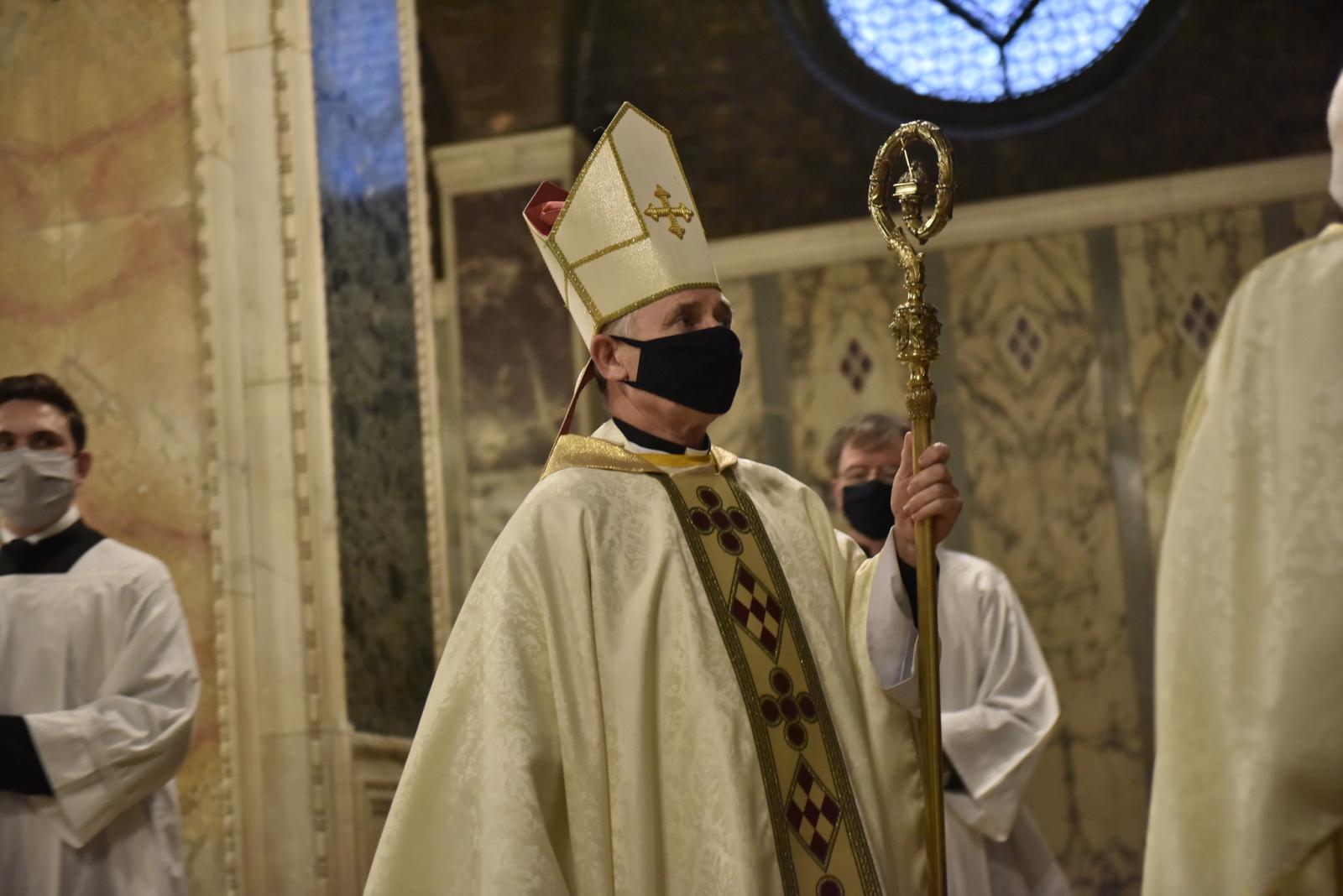This homily was delivered by Bishop Paul at the ordinations to the permanent diaconate in Westminster Cathedral on 31st October 2020.
Every month the Pope has a particular prayer intention; Catholics are asked to include this intention in their prayers. In May of this year the Holy Father’s intention was the Deacons of the Church. In presenting his intention he said deacons are guardians of service in the Church. A very beautiful way of understanding the ministry of a deacon. Often it is asked, what can a deacon do? That is, what can he do in comparison to a priest. The Holy Father says, ‘No, I will tell you what a deacon is; he is one who protects the charism of service by living it and witnessing to it.’
On the morning I was ordained Bishop, I was in the sacristy preparing for the ceremony. I was handed a dalmatic, the vestment of a deacon, and asked to put it on underneath all the other vestments I was to wear, a reminder that as a Bishop one is still a deacon, the dalmatic underneath a reminder that service is the foundation of ministry.
In his earthly ministry, Jesus revealed his self-understanding when he said, ‘The Son of Man came to serve and not to be served and to give his life as a ransom for many’. Everyone, lay and ordained, is called to service, though deacons participate in it in a special way. In their ministry, its importance is elevated and given a noble status.
When the Apostles chose those seven in the Reading which we heard, it might appear that it was for practical reasons; they can serve while we preach. Though it wasn’t simply for good management or order; for hands were laid upon them, the Holy Spirit was invoked, associating them with Christ that they might receive the gifts they needed. In today’s ceremony we too will lay on hands and call upon the Holy Spirit, dedicating them, not as managers, or experts but as those who minister, who serve. Even though we are all expected to be servants, the deacon makes service central to his life.
In May, the Holy Father said deacons are an invigorating symbol for the Church. In their ministry they show forth and reveal what is essential.
Who and what will they serve? They will serve the word of God which has been revealed to us in the Scriptures, be entrusted with proclaiming the Gospel. They will be handed the Book of the Gospels and told, ‘Receive the Gospel of Christ, whose herald you have become. Believe what you read, teach what you believe, and practice what you teach’.
They will serve at the altar, preparing the gifts which are offered, preparing the bread and wine which become Christ’s Body and Blood.
They will serve charity in all kinds of ways, in all kinds of places. In this current pandemic it is encouraging how the Church’s involvement and response to need has been acknowledged and recognised.
It is good to see so many deacons of the diocese present here today. Invigorating signs, as the Pope said. Included in service is fraternal support, which we all need. I am sure that you welcome Andrew, Jonathan and Paul into your midst.
Today I wish to not only acknowledge but to thank all the wives of deacons and their families, especially those of the three men being ordained today. Your support and generosity is recognised and appreciated. The Holy Father speaking of deacons said they live their vocation in and with their family. It is a ministry not intended to undermine, but will foster, promote and enhance family life.
Here we also celebrate the Church to which we all belong. In the ordination of Paul, Andrew and Jonathan, we see the fruition of a collective effort of cooperation and support: from families, friends, directors, guides, formators under the guidance of the Holy Spirit.
The journey to this moment began with the seed which the Lord planted in the hearts and minds of Jonathan, Andrew and Paul. In the Letter to the Hebrews a verse contains the words, ‘The word of God is alive and active’; it is living, it makes things happen. That word has been active in the lives of those before us. They heard it, perhaps initially wondering what these thoughts, this movement within them, was. Perhaps like our Blessed Lady they pondered what this would mean for them, what the consequences would be.
They explored it, followed and accepted the prompting they experienced. The Church recognises that they have been called by God who throughout the ages calls people to serve him in the ministry.
We give glory and thanks to God today who promised to be with the Church until the end of time and who has provided us with these men who will ordained to be of service for his people.
The Gospel ended with the words, ‘a city built on a hilltop cannot be hidden’. It is visible from all around. The lights shining from the city act as a guide for travellers. We pray that all our deacons, including those being ordained here today, will be instruments of God and, through their preaching and service, guide the people of God closer to him.
